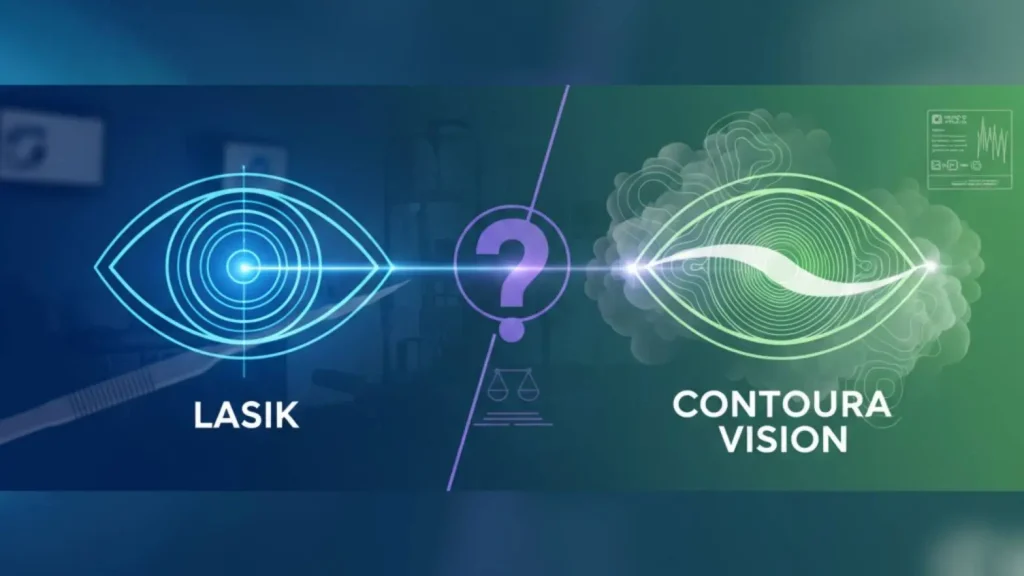LASIK vs Contoura Vision: Which Is Better For You?

AUTHOR
Ophthalmologist/ Eye Surgeon 13+ Years Exp
MBBS, MS – Ophthalmology
TREATMENT
CALL US 24/7 FOR ANY HELP
GET IN TOUCH ON
Deciding to get laser eye surgery is a major step towards a life free from glasses and contact lenses. But once you start your research, you quickly realise there isn’t just one type of procedure.
Two of the most common names you’ll encounter are LASIK and Contoura Vision. This can lead to confusion: what’s the difference, and which one is the right choice for your eyes?
Understanding the nuances between these advanced procedures is key to making an informed decision.
Both aim to correct your vision, but they use different technologies and approaches to achieve that goal. Your specific prescription, the unique shape of your cornea, and your lifestyle all play a role in determining the best fit.
This guide will break down everything you need to know about LASIK and Contoura Vision. We will compare them on technology, procedure, results, and suitability. By the end, you’ll have a much clearer picture of which path to spectacle-free vision might be right for you.
What Is LASIK Surgery?
LASIK (Laser-Assisted In Situ Keratomileusis) is a type of refractive surgery that corrects common vision problems. It works by permanently reshaping the cornea, the clear front part of the eye, so that light entering the eye is properly focused onto the retina. It has been a trusted procedure for decades, helping millions achieve clear vision.
How does the LASIK procedure work?
The LASIK procedure involves two main steps and uses two types of lasers:
- Flap Creation: A surgeon uses a femtosecond laser to create a thin, precise flap in the cornea. This flap is gently lifted to expose the underlying corneal tissue.
- Corneal Reshaping: An excimer laser, guided by your glasses or contact lens prescription, removes a microscopic amount of tissue to reshape the cornea.
- Flap Repositioning: The flap is then placed back in its original position, where it adheres naturally without the need for stitches.
LASIK is highly effective at correcting myopia (nearsightedness), hyperopia (farsightedness), and astigmatism.
What Is Contoura Vision?
Contoura Vision, also known as Topography-Guided LASIK, is an advanced and more personalised version of LASIK surgery. While standard LASIK corrects vision based on your prescription, Contoura Vision goes a step further by also mapping and correcting microscopic irregularities on the surface of your cornea.
How is Contoura Vision different from standard LASIK?
The primary difference lies in the level of customisation. Contoura Vision uses a specialised diagnostic device called a topographer to map up to 22,000 unique elevation points on your cornea. This creates a highly detailed, 3D map of its surface, much like a fingerprint.
This map guides the excimer laser, allowing it not only to correct your prescription but also to smooth out the tiny imperfections on your cornea that can cause issues like glare, halos, and difficulty with night vision.
In short, Contoura aims to create an optically perfect corneal surface, often resulting in vision that can be sharper than what is achievable with glasses or contacts.
Related Read : Why Should you Choose Contoura Vision For Specs Removal?
LASIK vs. Contoura Vision: A Head-to-Head Comparison
To help you understand the key distinctions, let’s compare these two procedures across several important factors.
Feature | Standard LASIK | Contoura Vision (Topography-Guided LASIK) |
Correction Based On | Glasses/Contact Lens Prescription | Prescription + Up to 22,000 unique corneal points |
Technology Used | Femtosecond & Excimer Laser | Topographer + Femtosecond & Excimer Laser |
Level of Personalisation | Standard (based on prescription) | Highly Personalised (based on unique corneal shape) |
Potential Vision Quality | Excellent, usually 20/20 or better | Exceptional, potential for “superhuman” vision (>20/20) |
Correction of Higher-Order Aberrations | Limited | Specifically targets and corrects corneal imperfections causing glare, halos, etc. |
FDA Approval | Yes | Yes |
Who Is a Good Candidate for Each Procedure?
Your eligibility for either procedure depends on a thorough eye examination. However, there are general guidelines for who might be a better fit for each.
Who is a good candidate for LASIK?
You may be a good candidate for traditional LASIK if you:
- Are over 18 years old.
- Have a stable prescription for at least one year.
- Have a common refractive error (nearsightedness, farsightedness, or astigmatism).
- Have sufficient corneal thickness.
- Are in good general health.
Who is a good candidate for Contoura Vision?
Contoura Vision is an excellent option for most LASIK candidates, but it is particularly beneficial for individuals who:
- Have irregularities on their cornea.
- Experience significant glare, starbursts, or halos with their glasses or contacts.
- Desire the highest possible quality of vision, potentially better than 20/20.
- Meet all the general criteria for LASIK.
It’s important to note that not everyone is a candidate for Contoura. If your vision problems are not related to corneal irregularities, the added benefits may not apply.
What Are the Recovery Times?
Recovery for both procedures is remarkably fast.
- LASIK Recovery: Most patients notice a significant improvement in their vision within a few hours of the procedure. You can typically return to most normal activities, including work, within 24-48 hours. Your eyes will continue to heal and your vision will stabilise over the following weeks.
- Contoura Vision Recovery: The recovery timeline for Contoura Vision is identical to that of standard LASIK. Because the fundamental surgical technique of creating and lifting a flap is the same, the healing process is also the same.
Is Contoura Vision Safer Than LASIK?
Both LASIK and Contoura Vision are considered extremely safe and effective procedures with very high success rates. Contoura Vision is not inherently “safer” in terms of surgical risk, as it uses the same core LASIK technique.
However, by correcting the finer imperfections on the corneal surface, Contoura Vision can reduce the risk of post-operative visual side effects like glare, halos, and poor night vision. For some patients, this leads to a higher quality of vision and greater overall satisfaction, which can be interpreted as a “better” or more reliable outcome.
Which Procedure Costs More?
Generally, Contoura Vision is more expensive than standard LASIK. The higher cost is due to the advanced diagnostic technology (the topographer) and the more complex software used to plan and execute the personalised treatment.
While the exact price difference varies by clinic and location, you can expect Contoura Vision to carry a premium. When considering the cost, it’s essential to weigh the potential for superior visual quality against the additional investment.
Key Takeaways
- LASIK is a proven and effective procedure that corrects vision based on your glasses or contact lens prescription.
- Contoura Vision is a more advanced, personalised form of LASIK that uses a topographic map to correct both your prescription and unique corneal imperfections.
- The Main Difference is the level of customisation. Contoura provides a more precise treatment by smoothing the corneal surface.
- Visual Quality with Contoura can be superior, often reducing issues like glare and halos and potentially delivering vision sharper than 20/20.
- Recovery and Safety profiles for both procedures are nearly identical and considered excellent.
- Cost is the main drawback for Contoura, as it is typically more expensive than standard LASIK.
Frequently Asked Questions (FAQ)
Q: Can Contoura Vision correct a high prescription?
A: Yes, Contoura Vision can correct a wide range of prescriptions for nearsightedness and astigmatism, similar to standard LASIK. Your surgeon will determine if your specific prescription falls within the treatable range during your consultation.
Q: Is the Contoura Vision procedure painful?
A: No, neither Contoura Vision nor LASIK is painful. Your eyes are completely numbed with anaesthetic drops before the procedure begins. You may feel a slight pressure sensation, but there is no pain.
Q: Which procedure gives better night vision?
A: Contoura Vision is specifically designed to improve visual quality by reducing corneal imperfections that often cause poor night vision, glare, and halos. Many patients report superior night vision after Contoura compared to their vision with glasses or even standard LASIK.
Q: How do I choose between LASIK and Contoura Vision?
A: The best choice depends on a comprehensive eye evaluation and a discussion with your ophthalmologist. If the topographic mapping shows significant corneal irregularities, your surgeon will likely recommend Contoura Vision for the best possible outcome. If your cornea is relatively smooth, standard LASIK may be perfectly sufficient.
Ready for crystal-clear vision? Trust Envision LASIK Centre, Hyderabad’s top hospital for LASIK and Contoura Vision.
Book your consultation today and take the first step toward a life free from glasses and contacts!
AUTHOR
Ophthalmologist/ Eye Surgeon 13+ Years Exp
MBBS, MS – Ophthalmology
TREATMENT
CALL US 24/7 FOR ANY HELP
GET IN TOUCH ON



